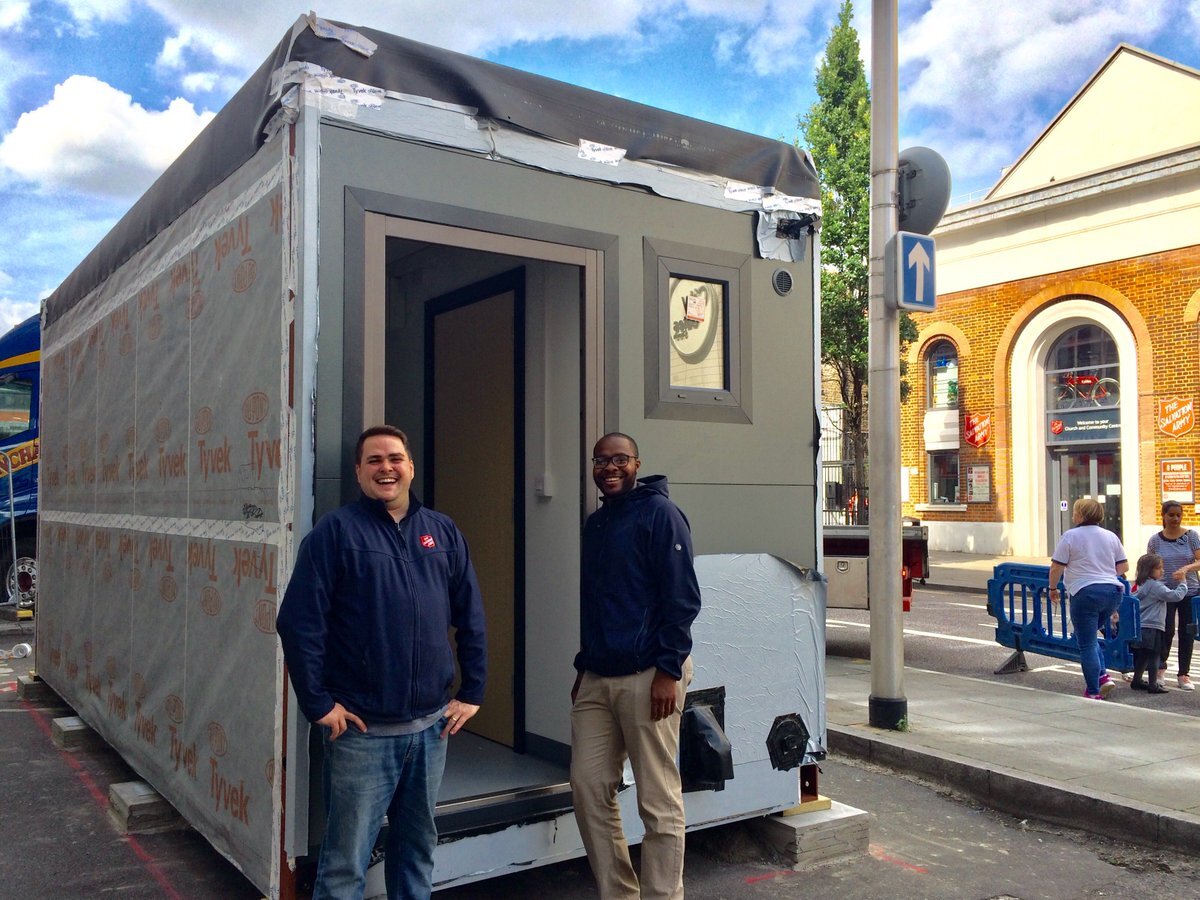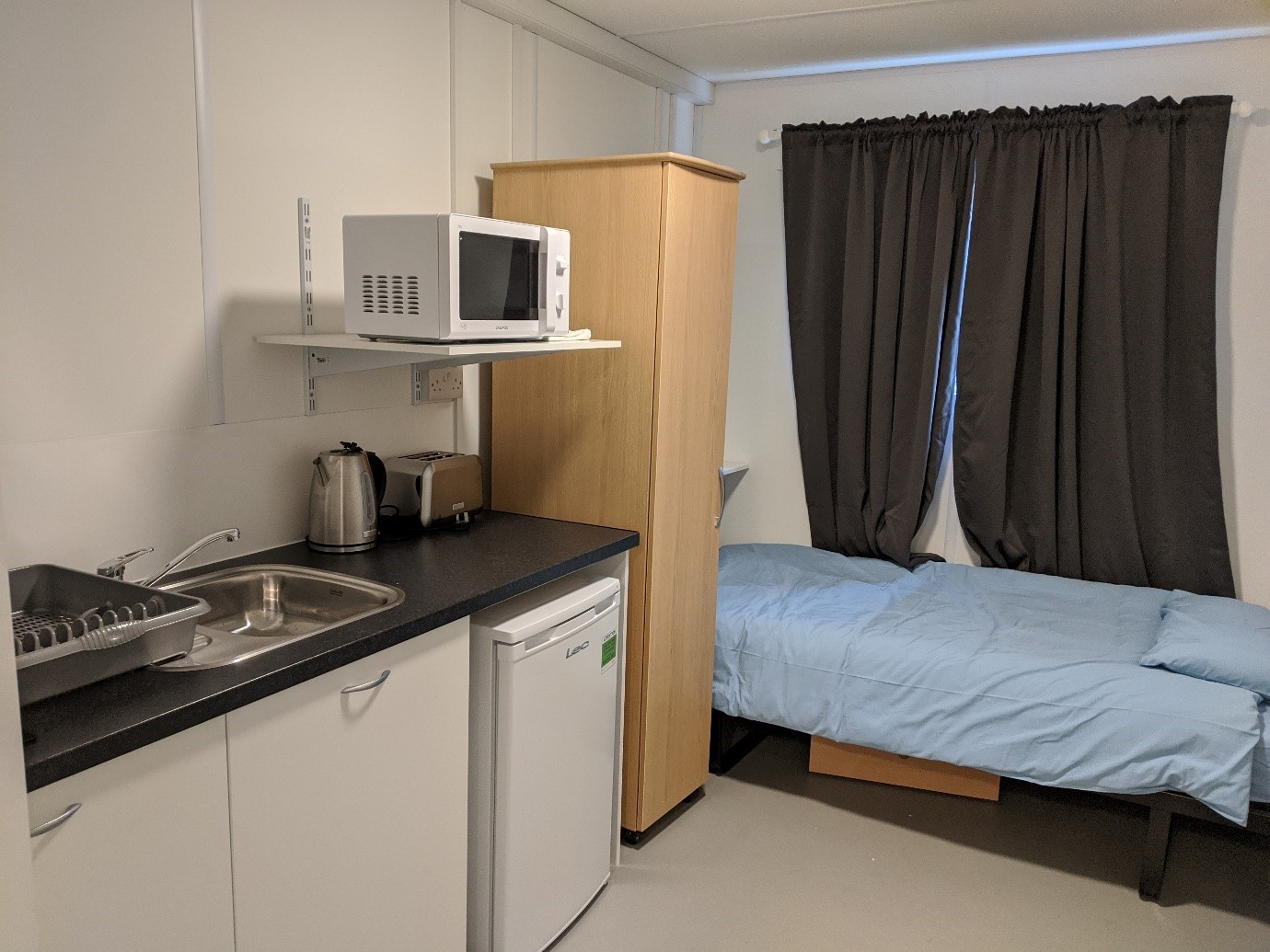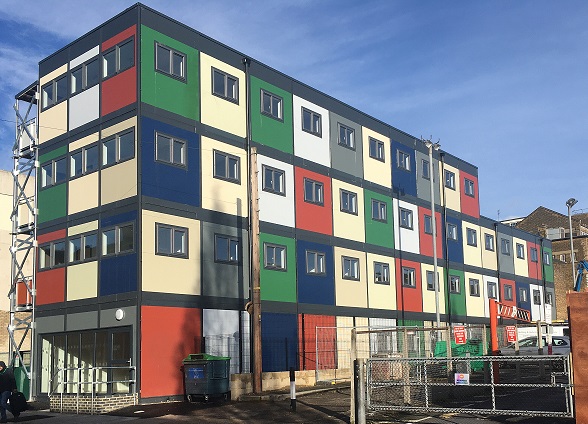21/05/2020
This blog is written by a member of the independent Commission. These views do not necessarily represent the views of the Archbishops' or the Church of England.
Captain John Clifton and Cedric receiving the first modular home for Malachi Place
Ilford Salvation Army had run a night shelter since 2011. In that time, they’d expanded and improved their provision: they judged themselves by how high off the floor the beds were, starting with mats, then camp beds, and finally proper mattresses! But after a few years, they wanted to find a more sustainable response to homelessness.
Many of those they were helping have ‘no recourse to public funds’. This is a condition imposed on someone due to their immigration status. It means you will not be able to claim most benefits, tax credits or housing assistance that are paid by the state. People with no recourse to public funds often end up on the street. The church aspired to house them more securely – something which is proving even more critical after the ‘Everyone In’ policy in response to COVID-19.
In 2016, they noticed a bit of land across the road was sitting empty. Captain John Clifton, their church leader, had been thinking about modern businesses, and had come across the idea of ‘meanwhile use’ – where empty land and buildings are rented to others while their primary user isn’t using them. John knew that the land wasn’t free forever – it was going to be redeveloped – but thought that it was a shame that it was only going to be used as a car park in the meantime.
They couldn’t build a permanent hostel – the land was needed within the next ten years. Working with experienced architects, they came up with a solution to erect modular units, which could be quickly assembled and then ‘redeployed’ elsewhere when the site is redeveloped. The plan was that each resident would get a self-contained studio, which was already important for their privacy but now also helps to reduce the risk of infection.
This wouldn’t be cheap, so they started fundraising. One of the first donations they received was £5 from a boy called Malachi – money from the tooth fairy. They decided to name the scheme ‘Malachi Place’.
It would also require council buy-in – it was their land, and could only work financially if, along with those with no recourse to public funds, they housed people who were eligible for housing support. They found that the best way to get this was to negotiate a partnership and show wide support. They put together a sponsoring committee of different faith leaders, turned out 100 people to the council meeting for the planning application, 80 letters were sent in support, and 400 people signed a petition, demonstrating public support for the scheme.
The council, and particularly the Leader Cllr Jas Athwal, were very supportive of the project and provided the land, along with £2.5 million for the new units. Now, 42 people have somewhere to rebuild their lives, 15 of whom have no recourse to public funds.
John explains that ‘it’s not just about having a roof over their head’. The homes provide structure and a routine to those living there, while support staff are on hand to provide tailored assistance to each resident. Partners RAMFEL (Refugee and Migrant Forum of Essex and London) help those with no recourse to public funds to put together a legal case to get this changed. They’re even establishing a bike refurbishment social enterprise to offer residents employment skills. The self-contained nature of the units has made it easier for them to continue through the COVID-19 pandemic.
John says that they want this to be ‘the first, not a one-off’. Ilford Salvation Army had never done anything like this before, but they are now changing lives. The Archbishop of Canterbury’s Housing Commission would like to encourage churches to move to a more preventative response to homelessness. Malachi Place exemplifies a new way to do this. What could your church do to prevent homelessness?
Notes
- In 2016, Ilford Salvation Army found the potential site, and started working with consultant Andy Redfearn, from LivShare Consulting, on a solution.
- In 2017 they engaged architects, and the land was cleared in the summer of 2017. Planning permission was granted in 2018 and Malachi Place was built by 2020.
- The new units can house 42 people across 4 stories. 15 of these spaces are for people with no recourse to public funds.
- While the Salvation Army is well known for providing homelessness hostels, these are usually run independently of their churches. This is the first Salvation Army church to directly run a hostel.
- The building is made of ‘volumetric modular units’, meaning that it could be built elsewhere and simply reassembled onsite. This is ideal for this site, as they only have a 5-year lease. After 3 years, they will consider future options: whether they should be redeployed elsewhere or whether they can extend their lease.
- The church has closed its night shelter to focus on running the hostel, but this has meant a considerable net increase in the number of beds.
- Malachi Place has been allocated land free of charge by the council, who paid £2.5 million for the construction of the building. At the end of the 5 years, the Salvation Army has the option to buy the units from the council, in order to redeploy them elsewhere.
- The council pays housing benefit for 27 of the units. Along with funding from the Salvation Army and donations, this will cover the running costs of the whole hostel.
- Along with support from members of the public, the Salvation Army rallied other faith organisations to support the initiative.
- The Salvation Army in Ilford already had a good track record, and the scheme addressed an issue that the council wanted to deal with.
- In 2017, 49 of the 65 people in the Ilford rough sleepers’ count had no recourse to public funds.


